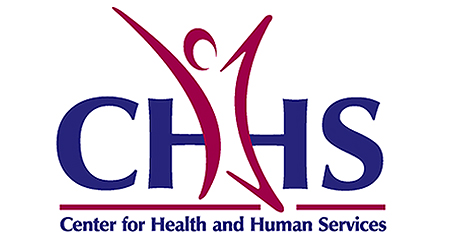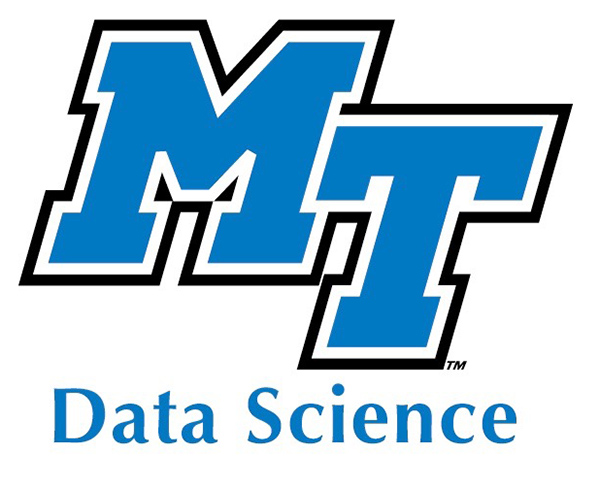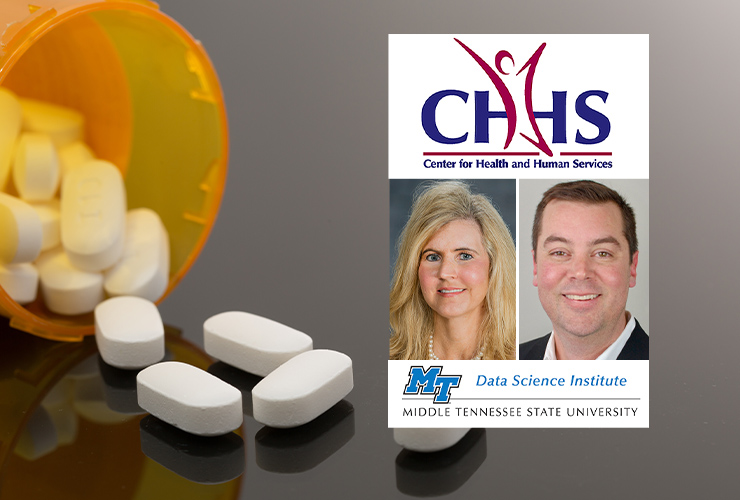Middle Tennessee State University’s Center for Health and Human Services, in conjunction with the university’s Data Science Institute, will soon launch the MTSU Office of Prevention Science and Recovery in response to the national opioid epidemic and, more specifically, to Rutherford County and opioid settlement dollars being made available to states and local governments.

Organizers say this new office will leverage the expertise and experience of MTSU’s CHHS, which has a mission of better health and well-being for all Tennesseans and that of the nation, and the university’s Data Science Institute, which facilitates taking complex data and turning it into actionable, value-added information that solves important problems.

Rutherford County has provided funds to CHHS, in partnership with the Data Science Institute, to launch the MTSU Office of Prevention Science and Recovery.
The office will provide expertise and technical assistance to the Rutherford County Opioid Board as that organization receives applications from community organizations seeking funds for opioid- and substance use-related activities and services.
“With CHHS’ successful track record of multiple federal and state grant-funded projects concerning opioid and substance use disorder to improve the health and wellbeing for Tennesseans, we are excited to serve the Rutherford County community — with potential for other Tennessee counties as well — through the establishment of the MTSU Office of Prevention Science and Recovery,” says CHHS Director Cynthia Chafin.
Local control of funding, decisions
The U.S. Centers for Disease Control and Prevention reports that more than 932,000 people have died of drug overdoses in the United States since 1999 with opioid overdoses the main driver of these deaths. In 2020, 75% of the nation’s nearly 92,000 drug overdose deaths involved an opioid.
Since 2021, there have been a series of landmark settlements involving drug distributors, pharmacies and manufacturers that have been identified as contributing to the opioid crisis.
These settlements, which top $50 billion nationally with dollars flowing down to states and local governments, are is the second largest public health settlement in U.S. history, second only to the tobacco master settlement in the 1990s.

Tennessee is set to receive $31.4 million in abatement dollars during 2023, according to the Tennessee Department of Mental Health and Substance Abuse Services. A Tennessee State Government Opioid Abatement Council report indicates that Rutherford County will receive over $1.5 million in 2023 with more funds anticipated this year and in the future.
Additional abatement dollars are available to Tennessee counties through a state-administered application process that has not yet been announced.
Local governments are making decisions on how to spend the dollars already allocated to their counties and are considering application processes for local organizations to apply for and receive the funds. Officials have said they need an evidence-based and systematic approach to funding and monitoring local activities and services to ensure opioid settlement dollars are spent wisely on evidence-based research and programs as well as projects that address opioid and substance use prevention, treatment and recovery.
Application, scoring process
This is where the MTSU Office of Prevention Science and Recovery comes in. MTSU leaders say the office will develop an application and scoring process for Rutherford County community organizations seeking funding and will provide initial application screening, training and technical assistance to the board, metrics for monitoring and reporting, and meaningful data analysis.

“At MTSU, we have a unique blend of expertise that makes us ideally situated to help our community and state partners, specifically the Center for Health and Human Services and the Data Science Institute, which have a track record of working together in this area,” says Dr. Ryan Otter, director of the Data Science Institute.
“The opioid settlement funds, both in Tennessee and across the country, represent the scale of impact and harm of this crisis. This crisis not only touches those struggling with addiction, but the friends and families connected to those individuals as well. Different areas (e.g., counties) are in need of different solutions. This is a community problem that needs community solutions. At Middle Tennessee State University, we see ourselves as a community partner and leader, so helping to address this crisis is part of our mission and identity.”
Adds Chafin: “The MTSU Data Science Institute provides great value in this endeavor, and I am excited to see how the two centers can make a difference in this pressing national, state and local public health crisis.”

By creating the MTSU Office of Prevention Science and Recovery and leveraging subject matter expertise from the Prevention Coalition for Success, the county’s nonprofit substance abuse prevention coalition, Chafin notes that Rutherford County is leading the way across the state with this approach to ensure the most effective utilization of the county’s funds.
Final funding decisions will be made by the Rutherford County Opioid Board. Staff will be hired and will work jointly with and for CHHS and the Data Science Institute. The office may expand to provide services to other counties receiving opioid abatement funds and would like assistance.
Visit the CHHS website at www.mtsu.edu/chhs or the Data Science Institute at www.mtsu.edu/datascience/institute to learn more.
For more information on MTSU’s Center for Health and Human Services and the Office for Prevention Science and Recovery, email Chafin at Cynthia.Chafin@mtsu.edu or visit www.mtsu.edu/chhs.
— Cynthia Chafin (Cynthia.Chafin@mtsu.edu)


COMMENTS ARE OFF THIS POST